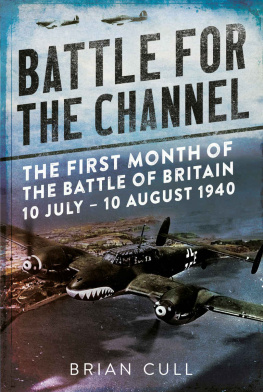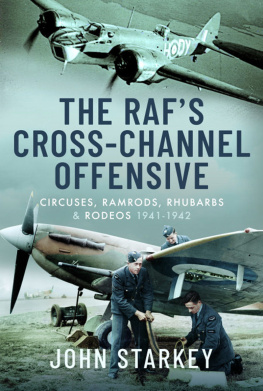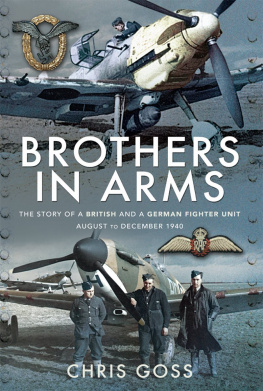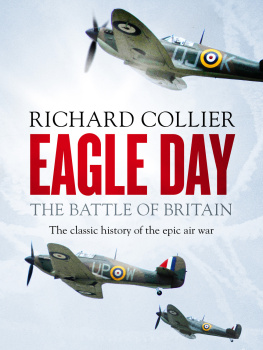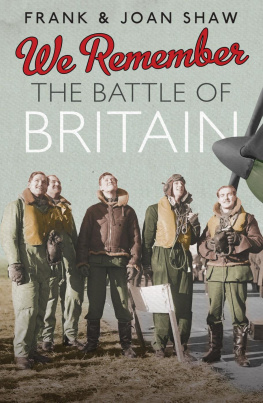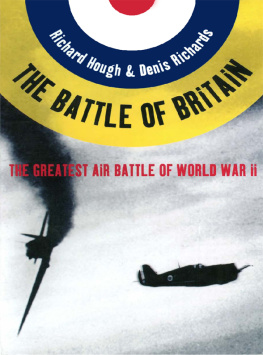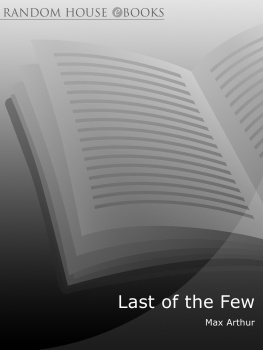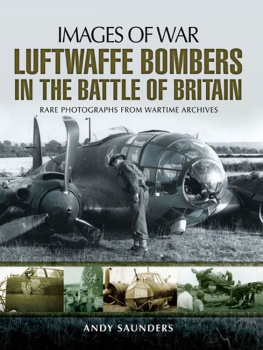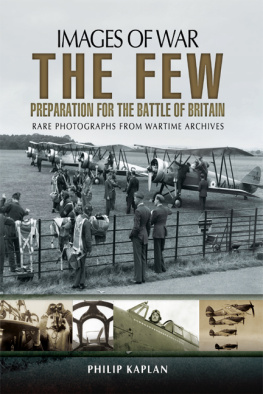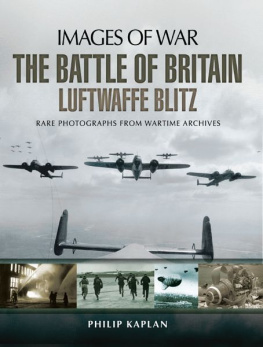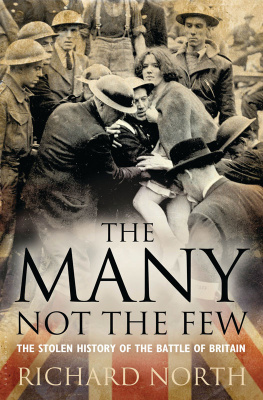

Fonthill Media Language Policy
Fonthill Media publishes in the international English language market. One language edition is published worldwide. As there are minor differences in spelling and presentation, especially with regard to American English and British English, a policy is necessary to define which form of English to use. The Fonthill Policy is to use the form of English native to the author. Brian Cull was born and educated in England and therefore British English has been adopted in this publication.
Fonthill Media Limited
Stroud House
Russell Street
Stroud GL5 3AN
Fonthill Media LLC
12 Sires Street
Charleston, SC 29403
www.fonthillmedia.com
First published in the United Kingdom and the United States of America 2017
British Library Cataloguing in Publication Data:
A catalogue record for this book is available from the British Library
Copyright Brian Cull 2017
ISBN 978-1-78155-625-2
The right of Brian Cull to be identified as the author of this work has been asserted by him in accordance with the Copyright, Designs and Patents Act 1988.
All rights reserved. No part of this publication may be reproduced, stored in a retrieval system or transmitted in any form or by any means, electronic, mechanical, photocopying, recording or otherwise, without prior permission in writing from Fonthill Media Limited
Typeset in 10 pt on 13 pt Minion Pro
Printed and bound in England
Contents
Preface
Battle for the Channel covers the First Phase of the Battle of Britain, from 10 July to 10 August 1940, during which period Channel shipping was the priority target for the Luftwaffe. This follows on from the account in First of the Few the first volume which itself commenced with the first heavy Luftwaffe raid on Britain on the night of 18/19 June 1940.
For several years I have toyed with the idea of compiling this intended series, ever since studying Francis Masons ground-breaking Battle for Britain, this being superseded by Peter Cornwells scholarly but now similarly slightly outdated but excellent The Battle of Britain Then and Now, although the latter remains the bible for those who wish to be thus educated.
There is no claim that this effort supersedes the above, or is in any way definitive far from it but it does take a similar approach to the aforementioned with a certain amount of updated material, and includes all known RAF and Luftwaffe claims, as well as losses relevant to both sides; bombers and reconnaissance aircraft in addition to the epic fighter battles, interspersed with personal accounts and stories. I have not overly attempted to amend claims in the light of post-war research, which shows that much over-claiming resulted from the mighty aerial clashes over southern England and particularly London during the long summer and autumn weeks of 1940.
Acknowledgements
First and foremost my thanks go to my wife Val, for without her constant encouragement and sometimes brow-beating, this work would not have been completed, while Fuzz (my little cat who has since died) invariably provided opportunity for a daily break in proceedings.
The material within has been gathered from a variety of sources over many years, including official records such as squadron ORBs and combat reports; published memoirs and unpublished personal accounts, and could be considered an anthology. I have endeavoured to include as much relevant first-hand information as could be found, extracted from many published and unpublished sources: the majority of these extracts are important to show the do-or-die situation that existed in the air at that time. Many of these personal stories and anecdotes are tucked away in various accounts and memoirs and deserve to see the light of day again, if only as a tribute to those who participated. My apologies should my acknowledgements not cover all sources.
The main listing of RAF combat claims was extracted from Combats and Casualties (Air records at The National Archive) and expanded by reference to squadron records and other sources. The main listing of Luftwaffe claims owe much to Tony Woods, and Luftwaffe loss details to Matti Salonen and Peter Cornwell. The actions and losses of Bomber Command and Coastal Command during this period are also noted: Bill Chorleys excellent Bomber Command Losses, Ross McNeills Coastal Command Losses and Larry Donnellys The Other Few complete the listing of quasi-prime sources. My thanks also to notable author and historian Chris Goss for advice, and gratitude to both Chris and John Vasco for permission to use quotes from their authoritative books (see Select Biography); and to Nick Hewitt, author of Coastal Convoys for permission to use extracts from his book; to Don Kindell of the RN-history website; and to Ruy Horta at 12 OClock High Forum, and Ross McNeill at RAF Commands Forum. Thanks are also due to my good friend Martin Goodman for information and photographs. Contributions from Bruce Lander, Brian Bines, Andy Mitchell, Laurent Rizzotti, Col Bruggy, Martin Gleeson, Gerry Burke, Hans Nauta, Mikkel Plannthin, Jaap Woortman, Peter Hasselgren, Chuck Schmitz, and Tim Oliver amongst others are acknowledged accordingly. Apologies to anyone I have failed to acknowledge. My good friend Frederick Galea has kindly read, edited and offered advice. Last but not least, my gratitude is extended to Alan Sutton, Jay Slater, and Josh Greenland at Fonthill for their encouragement, understanding and professionalism, as testified by this fine production.
NB: (a) Serial numbers of aircraft quoted herein are generally as recorded in ORBs/logbooks; research suggests that these are not always correct; (b) many ORBs were poorly maintained and some diarists recorded only code letters of aircraft and not serial numbers; others recorded neither, and in the case of 504 Squadron failed to contribute an ORB for July at all! Where there remains controversy, conclusions are invariably my own. Of course, there remain anomalies. Whether these remain unsolved will depend on future historians and enthusiasts.
Brian Cull
2017
The Battle may be said to have started when the Germans had disposed of the French resistance.
I have, somewhat arbitrarily, chosen the events of 10 July as the opening of the Battle. Although many attacks had previously been made on convoys, and even on land objectives such as Portland, 10 July saw the employment by the Germans of the first really big formation (seventy aircraft) intended primarily to bring our Fighter Defence to battle on a large scale.
Air Chief Marshal Sir Hugh Dowding,
Commander-in-Chief
Fighter Command
Preamble
When comparisons were made between the numbers of German aircraft available in relation to those of the RAF, the British commanders although accepting that the RAF was heavily outnumbered were becalmed by the fact that the Luftwaffe would have to fight over the Channel and the British mainland, whereby any aircrew forced to bale out would almost certainly become prisoners and their aircraft irrevocably lost. On the other hand RAF survivors would live to fight another day, even the same day, and damaged aircraft could be repaired. But the one great advantage the British had was the Home-Chain Low detection later known as radar which gave advance warning of approaching aircraft from across the Channel and North Sea. However, the system had been designed to detect bombers approaching the United Kingdom from the direction of Germany, and not from the French coast and thus the period between the radar warning and the arrival of the raiders was too short, although by far better than none at all. Nonetheless, the Germans never fully realised the importance of the Home-Chain Low defences and failed to destroy them, as emphasised by the following:
Next page
